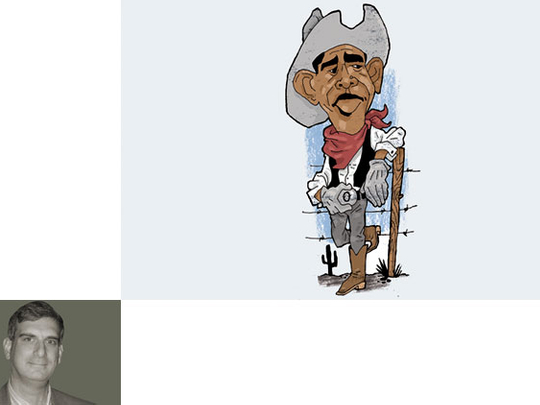
A number of US actions over the last few weeks — the Al Awlaqi killing, the alleged Iranian plot to assassinate the Saudi ambassador to Washington, even the State Department's slightly crazed pursuit of a diplomat who published a book it did not like — all lead back to the same basic question: why, when it comes to foreign policy, is US President Barack Obama so much like George W. Bush?
The most recent example of the Obama administration's mirroring of its predecessor is the alleged Iranian terror plot. This focuses on an Iranian sleeper agent who has supposedly been lying low in Texas for almost three decades, failing to make a living as a used car salesman.
According to the Justice Department he agreed to act as a middleman, using Iranian government money to hire a Mexican drug gang to assassinate the Saudi ambassador by blowing up a Washington restaurant.
An odd-sounding plot supposedly ‘foiled', even though it was far from fruition. Law enforcement officials who may have crossed the line into entrapment in their eagerness to announce yet another high-profile terror arrest. A suspect who looks more like a deluded loser than a terrorist mastermind. Where have we seen all of this before?
Such ‘plots' and the subsequent arrests were, of course, a regular fixture of the Bush years propelled along by both bureaucratic inertia and an American media generally willing, at least initially, to take pretty much anything the government asserts at face value where national security is concerned.
But this is not the Bush era. It is year three of Obama's presidency. Wasn't Obama supposed to be different? Wasn't he going to run his Justice Department and national security bureaucracy in ways that would stand in stark contrast to the eight years of his predecessor?
What the Obama administration's conduct highlights is one of the more subtle truths of American political life: as polarised as Washington's politics have become, foreign affairs remains one of the few places where a kind of bipartisanship rules.
National interest
Unlike, say, health care or education where policy intellectuals with vastly different views rotate in and out of government, foreign policy remains the preserve of a self-perpetuating elite.
Most of its leading figures (think of Robert Gates, Zbigniew Brzezinski, Dennis Ross or Brent Scowcroft) are reasonably comfortable working with a president of either party.
My own father, a staunch Democrat and political appointee under Lyndon Johnson, America's last proudly liberal president, still displays in his study a photo of himself in the Oval Office with conservative icon Ronald Reagan. It is framed alongside a presidential note of thanks for his help smoothing over a messy diplomatic issue involving the Soviet Union.
That represents the good side of the foreign policy elite: a belief that national interest trumps party sentiment. There are upsides to this. Because most modern presidents have arrived in the White House with little or no background in foreign and security policy the elite seeks to smooth things out.
If the Republicans were to nominate someone with genuinely loopy views (say, Michelle Bachman) and that person were then to go on to win the presidency, he or she would quickly discover that their scope for manoeuvre in picking officials for the departments of State, Defence and Homeland Security and for staffing up the National Security Council was a lot narrower than the new president, perhaps, imagined.
Value of continuity
The dark side of that ‘smoothing' is a belief in the value of continuity above all else. The elite can make a very compelling case to an untested president that it knows best.
The result is that while parties may rotate in office, in many respects surprisingly little changes.
Thus it is that drone strikes have risen dramatically under Obama. This is probably not because liberals like predator drones, or because Obama is tying to look tougher than Bush. It is, in all likelihood, because the military-intellectual establishment believes drones to be effective, and the president does not feel himself well-placed to oppose that view.
There is a lot to be said for a superpower not radically changing all of its policies every few years. But when the bureaucracy comes to see its own views as the only ones that merit consideration we need to ask where national interest stops and institutional interest begins.
Did Obama really want to be the president who maintained and expanded the world Bush built? That seems hard to believe. Yet it also seems to be the place at which we have arrived.
Gordon Robison teaches political science at the University of Vermont.










